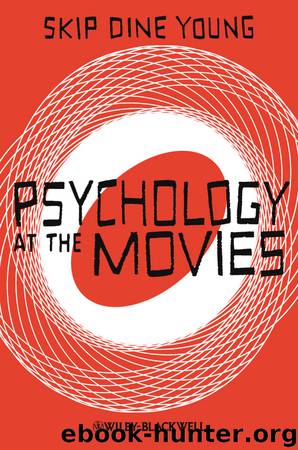Psychology at the Movies by Skip Dine Young

Author:Skip Dine Young
Language: eng
Format: epub
ISBN: 9781119941392
Publisher: Wiley
Published: 2012-03-14T00:00:00+00:00
Cultural Studies
In the essay Encoding/Decoding, Stuart Hall (1980) argues that complementary processes are involved in understanding any cultural product (television, movies, advertising, etc.). Encoding is the process by which creators imbue, either intentionally or unintentionally, a product with signifying codes (meaning). Decoding is the process by which the receivers of the product (in this instance, movie viewers) interpret that code and extract meaning from it. Decoding is not simply the mirror image of encoding, because decoders do not always share the same social views as encoders. It is not that the decoders are wrong; they simply have different backgrounds and sets of motivations. Decoders will adjust their interpretations to make them consistent with their worldviews. Since decoders come from different social circumstances, there will invariably be many different interpretations.
Hall's essay had a huge impact on cultural studies because it added a twist to ideological criticism.31 Interpreting cultural products as reifications of a culture's ideology becomes problematic if we acknowledge that cultural products can be decoded in multiple ways. With Hall's argument in mind, some scholars turned their gaze toward the audience and started asking about their reactions to popular media in personal interviews and focus groups (a group of 8-10 participants gathered to discuss specific research questions).32
A seminal audience study done in the late 1970s showed two episodes of a British news program to 29 focus groups representing different socioeconomic classifications in the United Kingdom (university students, technical apprentices, management trainees, and shop stewards).33 The researchers found that each group responded to the show in different ways. The variations were based on the attitude participants had about the program's messages. Bank management trainees and technical apprentices expressed a “dominant” attitude; they didn't agree with everything, but accepted basic assumptions that the program was accurate. The student teachers and trade union officials expressed a “negotiated” attitude: cynical about the tone of the program, without rejecting it. Black university students and shop stewards took an “oppositional” stance toward the program by rejecting it as intentionally misleading or by being apathetic.
Daytime dramas (or “soap operas”) have received a lot of attention from cultural scholars, thanks to the exaggerated picture of dominant cultural patterns they present. In the 1980s Dallas was a particularly fruitful object of study because of its popularity around the world.34 One might speculate there was something universally appealing about the nighttime soap opera, but cross-cultural focus groups failed to identify any silver bullet that provided universal entertainment.
Instead, the insights that emerged revealed an array of culturally dependent interpretations that suggested different notions of selfhood. Arabs and Moroccan Jews tended to focus more on story events. These were evaluated through a moral filter regarding the family roles played by the various characters. In contrast, Americans and Israelis were focused on individuals and displayed a heightened concern for their psychological motivations and their own emotional reactions. Finally, Russian respondents enjoyed the program, but took a distanced, critical stance to the characters’ behavior and the production itself. They questioned the intentions of the
Download
This site does not store any files on its server. We only index and link to content provided by other sites. Please contact the content providers to delete copyright contents if any and email us, we'll remove relevant links or contents immediately.
Rewire Your Anxious Brain by Catherine M. Pittman(18656)
Talking to Strangers by Malcolm Gladwell(13370)
The Art of Thinking Clearly by Rolf Dobelli(10489)
Mindhunter: Inside the FBI's Elite Serial Crime Unit by John E. Douglas & Mark Olshaker(9344)
Becoming Supernatural by Dr. Joe Dispenza(8217)
Change Your Questions, Change Your Life by Marilee Adams(7783)
Nudge - Improving Decisions about Health, Wealth, and Happiness by Thaler Sunstein(7709)
The Road Less Traveled by M. Scott Peck(7603)
The Lost Art of Listening by Michael P. Nichols(7506)
Mastermind: How to Think Like Sherlock Holmes by Maria Konnikova(7347)
Enlightenment Now: The Case for Reason, Science, Humanism, and Progress by Steven Pinker(7314)
Win Bigly by Scott Adams(7199)
The Way of Zen by Alan W. Watts(6614)
Daring Greatly by Brene Brown(6514)
Big Magic: Creative Living Beyond Fear by Elizabeth Gilbert(5774)
Grit by Angela Duckworth(5615)
Ego Is the Enemy by Ryan Holiday(5450)
Men In Love by Nancy Friday(5240)
The Laws of Human Nature by Robert Greene(5208)
